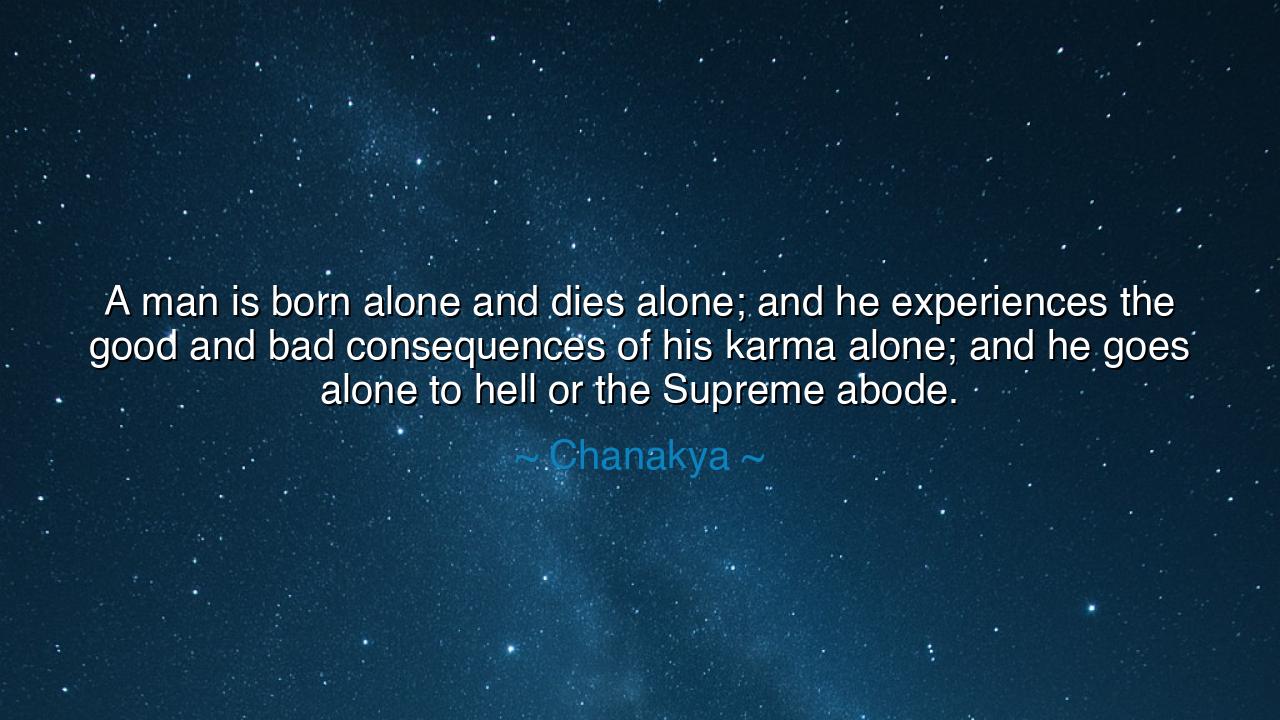
A man is born alone and dies alone; and he experiences the good
A man is born alone and dies alone; and he experiences the good and bad consequences of his karma alone; and he goes alone to hell or the Supreme abode.






When Chanakya said, “A man is born alone and dies alone; and he experiences the good and bad consequences of his karma alone; and he goes alone to hell or the Supreme abode,” he spoke as one who had seen the truth of human existence stripped of illusion. His words cut through the veils of pride and attachment, revealing the eternal solitude of the soul. In them lies a truth both humbling and liberating: that while man may walk among multitudes, laugh among friends, and love deeply, in the final reckoning, he stands alone before destiny. Birth, death, and karma — these three great thresholds of existence — are journeys that no companion, no friend, and no wealth can share.
Chanakya, the wise teacher of ancient India, was not one to speak in comfort or sentiment. He was a realist, a philosopher of iron and fire. His teachings, found in the Chanakya Niti, were meant to awaken men from the slumber of dependence — dependence on people, on pleasures, on illusions of permanence. In declaring that man is “born alone and dies alone,” he was not rejecting society or love, but reminding the seeker that the soul’s journey is solitary, and that wisdom lies in understanding this truth early in life. To know solitude is to know strength; to accept it is to find freedom from fear.
In the vision of karma, Chanakya saw the eternal law that binds every living being. Each thought, word, and deed plants a seed that ripens in its own time. Others may walk beside you, but none can bear the fruit of your actions — whether bitter or sweet. If your heart harbors kindness, you shall taste peace; if it harbors deceit, you shall meet its shadow. This is the inescapable justice of life. To blame others or seek refuge in excuses is to remain blind. Chanakya’s words remind us that each soul is the architect of its own fate, and that true wisdom is not to escape responsibility but to embrace it with clarity and courage.
There is a story told in the East of King Ashoka, the mighty ruler who once conquered kingdoms through blood and ambition. When he saw the field of Kalinga drenched in death, he felt a great emptiness pierce his heart. Surrounded by wealth, by armies, by counselors and servants, he realized that none could share his burden of guilt — it was his karma, and his alone. That moment of awakening transformed him. He renounced violence, embraced the path of Dharma, and dedicated the rest of his life to peace. His realization was the living echo of Chanakya’s truth: that though men may rise by the strength of others, they are redeemed only through the strength of their own soul.
The origin of Chanakya’s words lies in the ancient Indian understanding of the self — the Atman, the immortal consciousness that journeys through many lives, bound by karma until it attains liberation. This teaching was not meant to isolate man from the world, but to prepare him for detachment amidst it. In the crowd, he must learn stillness; in love, he must learn non-attachment; in success, humility; and in solitude, peace. For when the hour of death arrives, all masks are removed. No crown, no family, no friend can cross that final river with him. Only his deeds — his karma — walk beside him as his eternal shadow.
And yet, there is no sorrow in this truth, only clarity. To know that one is alone is not despair — it is liberation. It means that the soul is sovereign, that no man is a puppet to another’s will. In the stillness of solitude, one finds not emptiness, but the divine presence within. When a man learns to live with the awareness of his aloneness, he becomes fearless. He loves without clinging, works without pride, and gives without expectation. He becomes like a lotus on water — rooted in truth, untouched by the waves of circumstance.
So let this be the teaching, passed down as a torch for all who walk the path: Do not fear solitude, for it is the mirror of your soul. Remember that all companionship, all joy, all sorrow are but travelers on your road — they come and go, but you remain. Live with righteousness, so that when you stand alone before eternity, you stand without regret. For the measure of a man is not in his wealth or his followers, but in the peace he carries within when all else falls away.
In the end, as Chanakya taught, each of us must walk that final path alone — but if we have lived with truth, if we have acted with compassion, if we have known the silence of the soul, then that path will not be dark. It will be the journey home, lit by the light of one’s own deeds, leading not to fear, but to the Supreme abode where solitude and divinity become one.






AAdministratorAdministrator
Welcome, honored guests. Please leave a comment, we will respond soon